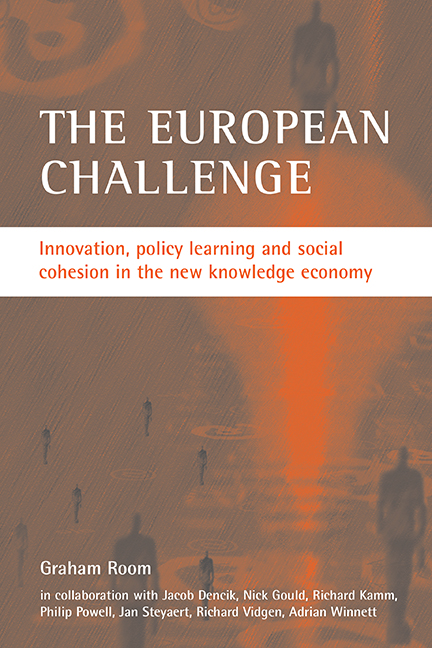Book contents
- Frontmatter
- Contents
- List of figures and tables
- Preface
- one The new knowledge-based economy
- two The EU response
- three Growth and stability
- four Dynamics and innovation
- five Enterprise and organisational change
- six Human investment and learning
- seven Social cohesion and inclusion
- eight Models and measurement
- nine Benchmarking and governance
- ten Globalisation and the knowledge economy
- Endnotes
- References
- Index
nine - Benchmarking and governance
Published online by Cambridge University Press: 18 January 2022
- Frontmatter
- Contents
- List of figures and tables
- Preface
- one The new knowledge-based economy
- two The EU response
- three Growth and stability
- four Dynamics and innovation
- five Enterprise and organisational change
- six Human investment and learning
- seven Social cohesion and inclusion
- eight Models and measurement
- nine Benchmarking and governance
- ten Globalisation and the knowledge economy
- Endnotes
- References
- Index
Summary
Introduction
In Chapter 2 we examined the Lisbon strategy for turning the European Union into “the most competitive and dynamic knowledge-based economy in the world, capable of sustaining economic growth with more and better jobs and greater social cohesion”. At the centre of this strategy were procedures for policy benchmarking among the member states, intended to promote policy convergence and the exchange of best practice but without enlarging the areas of policy which were an EU competence.
We also recognised, however, that within this Lisbon strategy there was a basic ambiguity (see also Room, 2005). The process is in part the offspring of monetary union: as such it seeks to extend similar disciplines to a broader range of policy areas which are important for the attainment of a competitive knowledge-based economy. Growth and stability are therefore key objectives of Lisbon, just as they were of Maastricht. It was by reference to those policy concerns that in Chapter 3 we considered the challenges to conventional economic analysis of growth and stability that are posed by the new economy, and the difficulty in defining appropriate benchmarking indicators.
However, Lisbon also affirmed that in order to develop a knowledgebased economy, the member states of the EU would need to accelerate the transfer of technological and organisational know-how from the best performers to the rest of the Community. Benchmarking provides intelligence about different national experiences, it enriches national debates and it enables political and economic actors on the ground to drive the process of comparison and policy learning, depending on their specific needs and interests. Dynamic learning and innovation are the key objectives. It was by reference to these policy concerns that in Chapters 5 to 7 we sought appropriate benchmarking indicators in relation to enterprises, education and training, access and inclusion.
Of course, it can be cogently argued that these two sets of policy objectives – growth and stability, dynamic learning and innovation – are complements rather than being in conflict. Nevertheless, their emphases are different and so are their implications for the practice of benchmarking. It is likely to be only by appreciating their respective implications that they can be reconciled in practice.
- Type
- Chapter
- Information
- The European ChallengeInnovation, Policy Learning and Social Cohesion in the New Knowledge Economy, pp. 143 - 150Publisher: Bristol University PressPrint publication year: 2005



